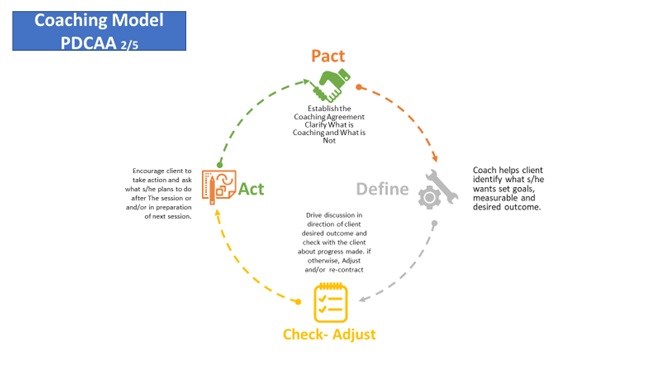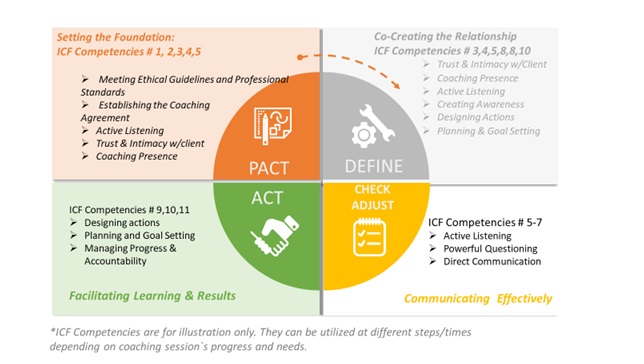A Coaching Model Created by Thierry Lacarne
(Executive Coach, HONG KONG)
Executive Summary
The coach owns the process and coachee owns the outcome! The coaching models help us understand the coaching relationship from the process perspective. This said while the coaching model offers a framework/system withing which coach and client work, The PDCAA approach zooms into the cycling effect enabling the continuous improvement. Because coaching is not a linear process, PDCAA – through “Check & Adjust” Offers the flexibility to get back and forth with our client to make sure we are addressing h/his agenda as we progress.
Using the parallel with PDCA (Deming Cycle) may not give “creative touch and uniqueness to my model” My only ambition here is to bring an added value to coaching with? the continues improvement approach”.
Why/How PDCAA can help both coach and client?
- Like the ICA Diagram(3 steps process Create/Implement/Review) the PDCAA cycle as a tool helps the Coach drive conversation with Client in sequence without being PRISONER of a strict process. Asa Cycle, it offers flexibility by going back to the previous step as and when deemed necessary for the full benefit of our client.
- Using PDCAA offers the opportunity for the Coach to standardize in her/his practice solutions that have enabled unlock new areas through continuous improvement.
- As coaches, we learned at ICA that coaching is a unique methodology where the coach owns the process, whereas the client owns the outcome!
- Yes, the focus on the process (not only on content) is of utmost importance. This way, as we progress in the session we check with our client if we are on track or if there is a need to adjust or re-contract. Going back and forth is encouraged as it helps make sure we are progressing towards the client desired outcome.
- When I first heard the idea of coaching as a "round trip" back to the starting point, I immediately thought of Deming cycle ( Plan, Do Check, Act), The process used for quality improvement. Originally developed by Walter A. Shewhart in the 1920s, The cycle draws its inspiration from the continuous evaluation of management practices...PDCAA will boost coaching for incremental improvement.
PACT: This is the Agreement step between Coach and Client. I am using To PACT as it highlights the need for an equal commitment of both parties for a productive journey where Client contribution is as important as the Coach. At this step we also make clear
- What is Coaching and What is Not
- Ensure Client with Confidentiality and Space
- Abide by ICF Code of Conduct/Ethics
DEFINE: Once Agreement created, we help Client identify, share what she/he wants to accomplish in the session( one or more). This is where the goals, measurables and desired outcomes are set.
- Seek clarity, understand what the client wants
- What is driving her/him?
- Why this is important to them?
- How they will know they have achieved the desired outcome?
- What will change once achieved?
CHECK: As It is very important to focus on Client agenda ( not on coach agenda) Checking with Client where we are during the process is a key success factor. We make sure the session is in line with/sticks to the session agreement. Useful questions to ask:
- How are we doing so far?
- Are we progressing towards your desired outcome/expectations?
- As compared to the initial position on the scale (1-10) or another measurable set, where are we now?
ADJUST: As stated above, by checking with the client we offer actually to both of us ( coach and client)the opportunity to refocus or even to change if it becomes obvious that client is sharing a different goal than the initial one. Adjusting can lead to Re-contract if necessary and therefore going back to Step 1 ( PACT )
By Adjusting we bring clarity and ensure that we are continuously driving the process towards Client – and client-only – the desired outcome.
ACT: At the end of the session it is important to close the loop by asking the client :
- Her/his feeling about today`s achievement?
- Any progress made? If Yes, why and how will it produce change?
- What actions/action plan the client is prepared to take?
The action plan should be written and shared. This becomes part of the “PACT” between Coach and Client enabling the Client moves forward thanks to the Cycle process

